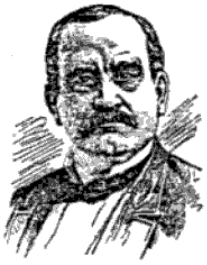Henry Gaston Bunn facts for kids
|
Henry Gaston Bunn
|
|
|---|---|
| Member of the Arkansas Senate from the district |
|
| In office 1873–1874 |
|
| Chief Justice of the Arkansas Supreme Court | |
| In office 1893–1896 |
|
| Appointed by | William Meade Fishback |
| Preceded by | Sterling R. Cockrill |
| Succeeded by | Joseph Morrison Hill |
| Personal details | |
| Political party | Democrat |
Henry Gaston Bunn (born June 12, 1838 – died July 17, 1908) was an important American lawyer, soldier, and politician. He became the Chief Justice of the highest court in Arkansas, called the Arkansas Supreme Court.
Contents
Who Was Henry Gaston Bunn?
Henry Gaston Bunn was born in 1838 in Rocky Mount, North Carolina. His parents were David and Elizabeth Bunn. When he was six years old, his family moved to Fayette County, Tennessee. Two years later, in 1846, they moved again to Ouachita County, Arkansas. His grandparents had moved to America from England a long time ago.
Education and Military Service
In February 1859, Henry Bunn started attending Davidson College. He was part of a student group called the Eumenean Society.
When the American Civil War began, he joined the Confederate States Army. He started as a private soldier. Later, he became a lieutenant and then a commander. By November 1862, he was leading the 4th Arkansas Infantry Battalion. His unit was under the command of General Evander McNair.
Bunn was hurt and captured during the Battle of Pea Ridge. But he managed to escape and found his team again. They joined General Earl Van Dorn's army. They crossed the Mississippi River and met up with General P. G. T. Beauregard's troops.
Henry Bunn fought in many important battles. These included the Battle of Farmington, Mississippi. He also joined General Edmund Kirby Smith at the Battle of Richmond in Kentucky. During this battle, he was promoted to colonel. Bunn also took part in the Battle of Stones River. With General Joseph E. Johnston, he fought in the Siege of Vicksburg and the Atlanta Campaign in Georgia.
On July 28, 1864, he was wounded again at the Battle of Ezra Church. He recovered by February 1865. He then fought in the Battle of Bentonville in March 1865. His time as a soldier ended when General Johnston's army surrendered. After the war, he decided to become a lawyer.
A Career in Law and Politics
Henry Bunn studied law in Arkansas. He passed his exams and became a lawyer in 1866. From 1873 to 1874, he served as a State Senator. He was involved in a political conflict known as the Brooks–Baxter War.
In 1874, he became a delegate for Ouachita County. He helped write a new state constitution. He was the head of the committee that worked on the bill of rights. He was also a member of the judiciary committee. Bunn also served as a special judge on the supreme and circuit courts. He became the President of the Arkansas Bar Association.
In 1893, he was chosen to be a trustee for the University of Arkansas. In May 1893, Governor William Meade Fishback appointed him as Chief Justice of the Arkansas Supreme Court. He replaced Sterling R. Cockrill. Bunn had tried to become Chief Justice before, in 1884, 1885, and 1889, but was not successful until 1893. In 1896, he was nominated by the Democratic party and elected. He served as Chief Justice for eight years.
Later Years and Legacy
In the early 1900s, Henry Bunn had a disagreement with Attorney General Jeff Davis. Bunn criticized Davis for taking off his coat in court. He said a gentleman should not appear in his shirt sleeves before the Supreme Court. Davis later joked to people that the "five jackasses" at the Supreme Court would not let him take off his coat.
The Arkansas Gazette newspaper praised Bunn. They said he was a very skilled judge. They also said he was honest and had strong principles. This was not the first time Bunn and Davis had a public disagreement. In 1903, Bunn was the only one who disagreed with Davis's decision to veto over 300 bills.
In 1904, Henry Bunn opened his own law office with W. E. Patterson. He continued to practice law until he passed away in 1908.
Family Life
On September 6, 1865, Henry Bunn married Louisa E. Holmes. Her father, Colonel W. T. M. Holmes, had died in the Confederate War. Sadly, Louisa passed away on July 5, 1866.
Later, he married Aralee Connolly. She was also the daughter of a Confederate Army soldier. Henry and Aralee had nine children together. However, only five of their children survived. Henry Bunn was buried at Oakland Cemetery in Camden, Arkansas.


